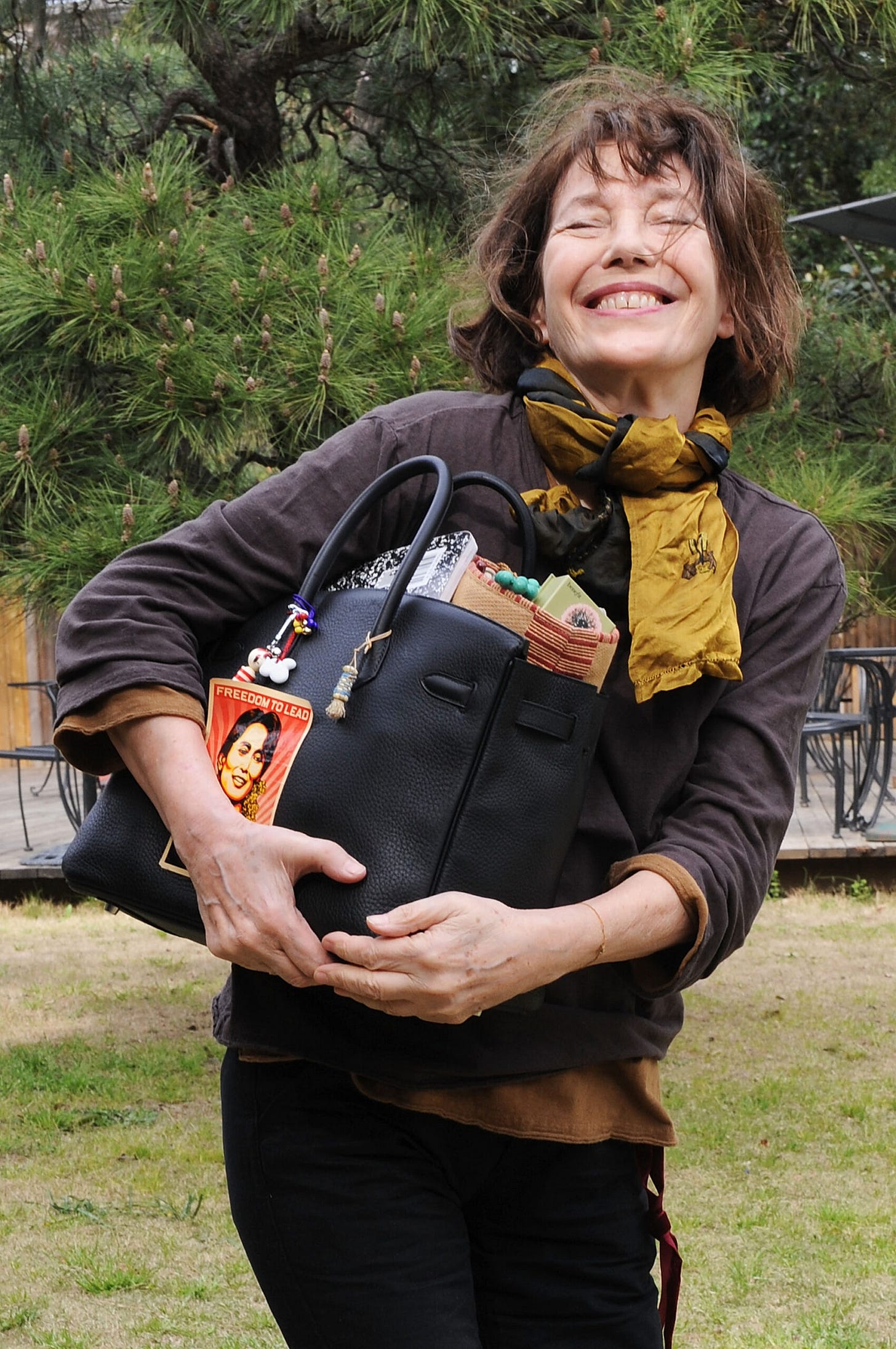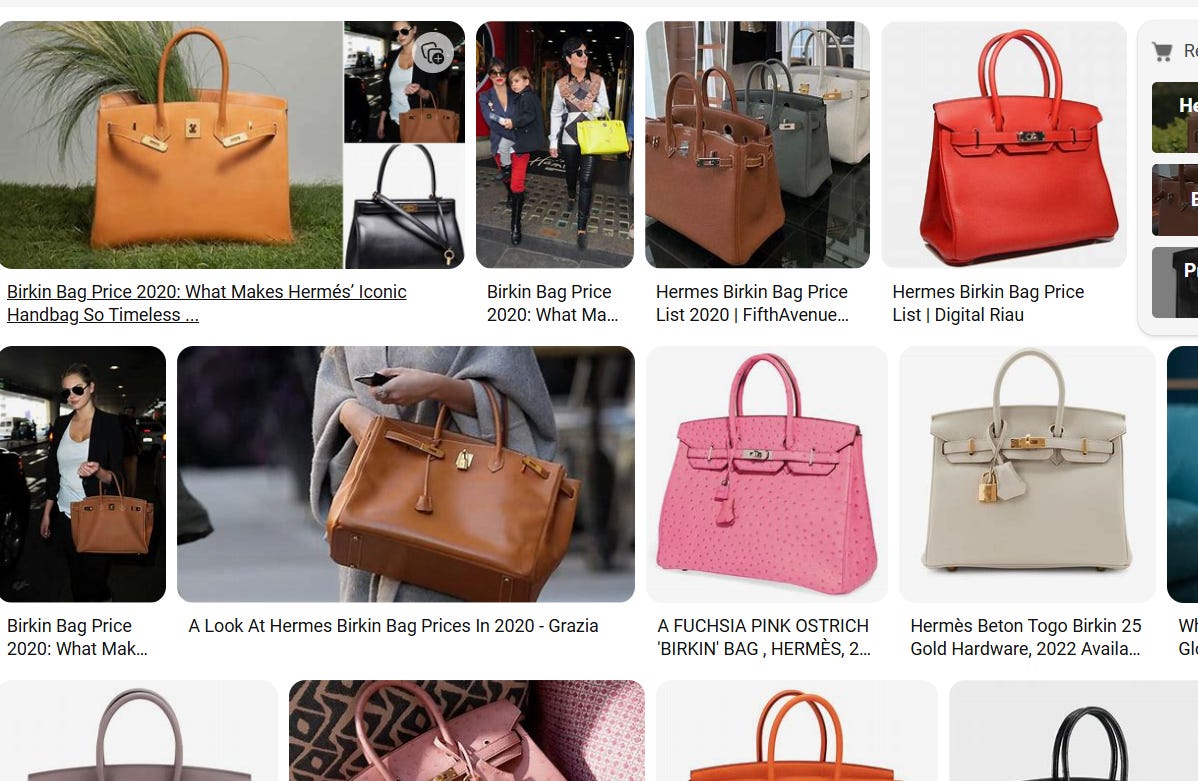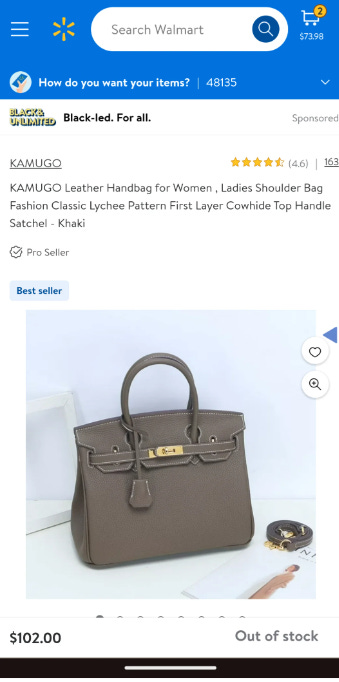The Wirkin, social class, and the return of the logo
If imitation is the sincerenest form of flattery, when does the gatekeeping start?
A few weeks ago a debate erupted on r/The Hermes Game, a sub-reddit dedicated to the luxury brand Hermes. People were up in arms over Walmart’s $102 dupe of the Birkin Bag, a bag which, for the unacquainted, resales for around $30,000 on average.
To many the debut of the Wirkin perfectly illustrated the problems with flex culture on the internet. To paraphrase one Redditor, you never see people sporting knockoffs of other iconic Hermes bags with equally hefty price tags. People seem to only care to do this with the Birkin so they can portray themselves as wealthier than they are and show it off as a status symbol.
It’s true, the Birkin is a status symbol, but that was never its intent. Jane Birkin, the actress who the bag is named after, asked Hermes to design an everyday bag for her. She wanted one that was sturdy and with a classic design that paired well with anything. That the Birkin has achieved a cult status at all seems to fly in the face of what its original intent was. Or, to quote another Redditor:
“[The] Birkin wasn’t originally made for people to have collections. it was meant to be used every day until it finally wore down.”
I mean, even Jane Birkin herself did that with her bag.
The Redditor continues:
“If it’s “not the vibe” or you find yourself bothered and upset, it’s because you don’t care to USE those bags for everyday use. You just want to display your wealth, so you see dupes as a threat to the ego boost you get for being able to afford a luxury good. You and people like you are much more shallowly concerned with looking rich than being rich.”
What’s interesting about the debate is not that it’s happening at all. (I mean there’s a lot to be said about the utility of trademarking in fashion and fair use. If you’re not aware, Calvin Harris does an excellent Ted Talk about the right to plargirize and why it’s so important in music and fashion.). Rather, it’s interesting that both sides are accusing the other of trying to flex their wealth.
If you spend any time floating around social media, you know how prevalent flex culture is - and has been - on the apps. You’d also be aware of how it’s evolved. Where Instagram used to be a beacon of women in bikinis in “exotic” locations, it’s now moved to “overconsumption core” or showing off just how much product you can amass. There are hauls. There are people restocking their bathrooms with 300 different body washes. There are - did I mention it - even more hauls. There are walk-in closet tours. There is apparently the “right” way to shower - which includes using soap, body scrub, body wash, and for some reason, two different kinds of perfumes.
In some ways, the move towards indulgence, wealth and overconsumption parallels a time not too far ago when cultural capital was through how many logos you wore and if MTV was willing to showcase your house on “Cribs.” We’re talking about the early aughts and “Logomania.”
There was Paris Hilton decked out in a Louis Vuitton logo-laden swimsuit. There were Juicy Couture sweatsuits with JUICY written on the butt. Then there were bags like the Fendi baguette, made popular by Carrie Bradshaw in Sex in the City. In other words, it wasn’t just about what you wore (style, cut, fit, material consumption), but who you were. The more logo laden, the better.
In part it was a reaction to the times. Post-9/11 made people focus on opulence and consumption to cope with the country’s collective PTSD. The Housing Act made it easier than ever to buy a house - and sub-prime mortgages meant that everyone was living large. Add in the rise of reality TV, and it was possible to see how the other half lived. Then came in a rush of inexpensive, fast turn over fast fashion (making it easier to have this season’s clothing at half the price), appearing wealthy was never, ever easier.
In some ways, all of these collective winds trickled down into handbag. Or, to quote the great author, Wikipedia:
[In the 2000s], a logoed purse was a visual unifier, worn by celebrities, models and "middle class" shoppers (who, because of growing income inequalities, earned increasingly less than habitual haute couture customers). Thanks to outlet stores and plentiful supplies of fast fashion "knockoffs", a logoed purse became available to everyone. For the majority of shoppers, a branded purse was a form of escapism; a unifying factor that let people forget how much money they made and present themselves as being more financially well-off.
Que 2008. The recession hit, the house market collapsed, and slowly but surely fashion backed away from logomania into more covert territory to deal with the waning purchasing power of consumers. What’s marked the past 15-ish years is subtle logos (like the Chanel Boy Bag, circa 2011) and subtle nods to the quality of craftsmanship (or say, “quiet luxury”) like the Birkin.
You can argue that a Birkin is a far cry from a Fendi Baguette. There’s no logo on it. If you weren’t deeply into handbags, you might not even know what the bag is or how much it costs. And yet - you can’t deny that there’s a certain truth in what the first Reddit poster got at in their quip. There’s an eerie feeling that our consumption patterns are echoing those of the early aughts, and the rise of social media has exacerbated the need to flex wealth through overt overconsumption. Somehow as the purchasing power of the average consumer has increased, so has lifestyle creep. No longer can we wear dupes of Juicy Couture or even the Baguette, we now need to move to the ultimate flex: the Birkin.
I’m not sure what to make of Wirkin mania or how people respond. I tend to agree with those who say that the Birkin is an aspirational item (it’s invite only!) and that if people can get something that is decent quality at a lower price, more power to them. But I also worry about what the collective obsession with consumerism says about all of us today. Are we teetering to the brink of another bad recession, or something even worse?
Or maybe all of this obsession with physical signs of wealth has to do with the malaise we all have. As Ezra Klein stated, the hyper-fixation people have towards national politics is very bad for mental health and society as a whole. Klein also says, we’re encroaching on oligarchy territory. Even if we aren’t oligarchs, is it so bad if we can feel like one for just a day?





